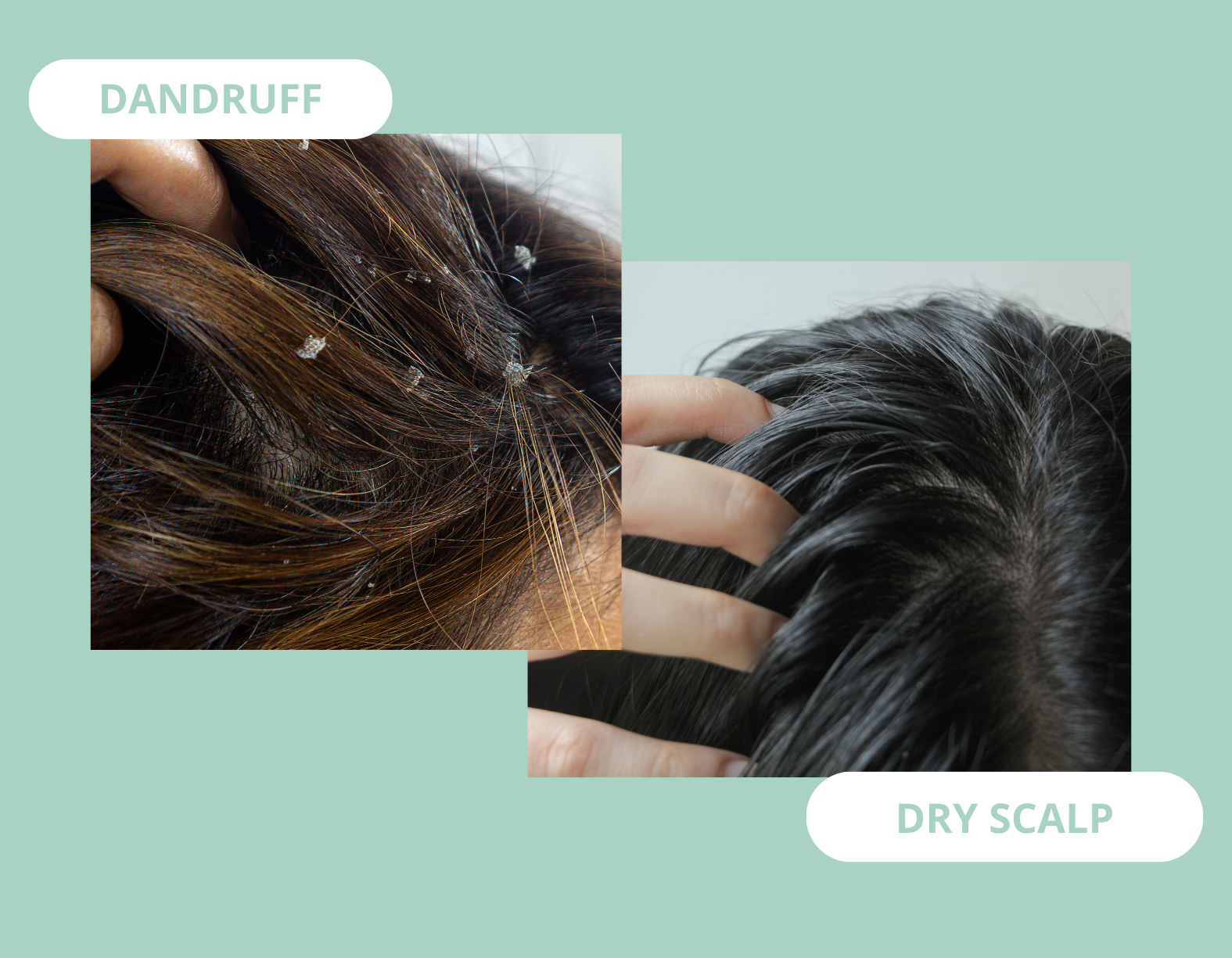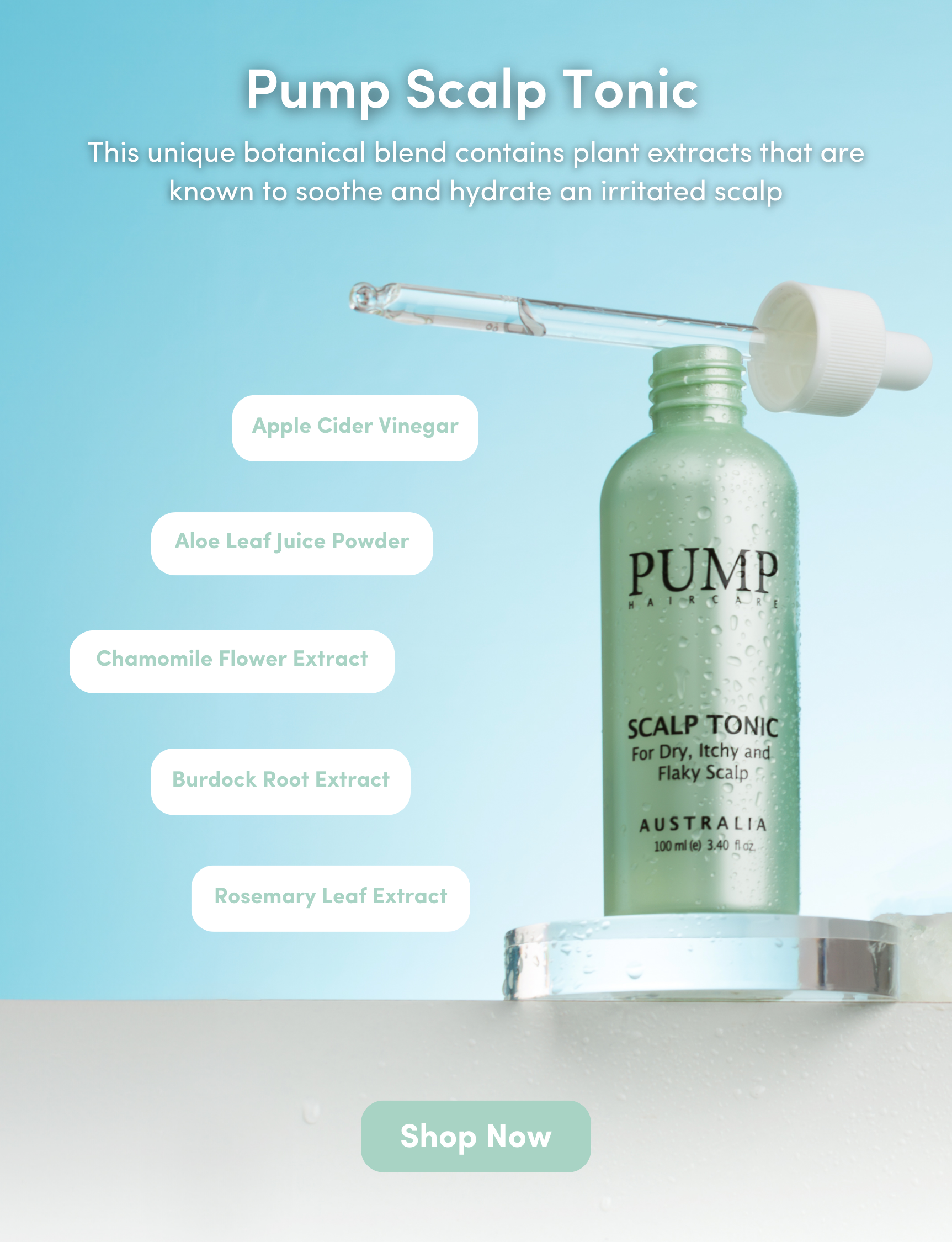Determining whether you are suffering from a dry scalp or dandruff can be a daunting, confusing task due to the similarities between the two conditions. They also have distinct causes and treatments to solve them so it is important to know how to identify which condition you have. To help you with this, we have done a comprehensive comparison to guide you in identifying and addressing these issues effectively.
What Is Dandruff?
Dandruff is characterised by the over-shedding of dead skin cells from the scalp and can develop into a chronic scalp condition. The primary reason for this is fungal infections, specifically an overgrowth of a yeast-like fungus known as Malassezia, which develops on the scalp. This imbalance is known to cause irritation and itchiness, causing skin cells to rapidly shed, resulting in dandruff.
What Is Dry Scalp?
Dry scalps, on the other hand, come from the scalp not producing enough sebum and natural oils, leading to a lack of moisture and oil on the scalp. This leads to flakiness, and itchiness, leaving the scalp feeling tight and cracked. The primary difference between dandruff and a dry scalp is the flakes are typically smaller and whiter than those seen in dandruff. Secondly, dry scalps are often caused by environmental factors of cold weather and low humidity or unhealthy hair care practices such as excessive washing, drying products, or the use of hot water causing the scalp to be stripped of its natural oils.
Dandruff vs. dry scalp: the comprehensive comparison
Here is a breakdown of the key signs you can use to identify if you are suffering from dandruff or a dry scalp and how to treat each condition effectively.

Flakes
Checking what type of flakes you are suffering from is the first telltale sign of which condition you have. Dandruff is marked by large, oilier and typically yellowish or grey flakes. Dry scalp flakes, on the other hand, are smaller white flakes and often appear powdery.
Itching
There is nothing worse than an itchy scalp. Unfortunately, an itchy scalp is a maker trait of both conditions. However, dandruff is typically associated with intense, persistent itching due to being a fungal infection whereas a dry scalp can be soothed with moisturising treatments.
Causes
A good place to start when identifying which condition you are suffering from is to evaluate your hair care practices and the environmental factors you are exposing your scalp to. This is because a dry scalp is caused by both drying hair care practices as well as dry environments resulting in your scalp not producing enough sebum and natural oils. Whereas, dandruff is due to a fungal infection.
Treatment
Once you have correctly identified which condition you are suffering from, there are several treatment methods, both natural and medicated treatments, you can take to treat these conditions.
Dry Scalp Treatment
For a dry scalp, you want to focus on moisturising and bringing balance back into your dry scalp. This can be done by using:
Coconut Oil
When it comes to deeply moisturising your scalp, coconut oil is the perfect solution as it acts as a barrier to lock in moisture and prevent your scalp from drying out. Gently warm some oil in the palm of your hands and massage it evenly throughout your scalp. Leave it for 30 minutes before washing it out.
Aloe Vera Gel
Aloe vera gel is another deeply moisturising solution for treating dry skin on your scalp. Apply it to your scalp for 30 minutes before washing it off with a sulphate-free shampoo.
Tea Tree Oil
Tea tree oil’s antimicrobial properties can help to balance the skin on your scalp. Make sure to use a carrier oil such as coconut oil or jojoba oil as by itself it can be too harsh. Apply it to your scalp for 10-15 minutes before washing it out.
Apple Cider Vinegar
@amyymajor this apple cider vinegar rinse is so easy to make & will deeply nourish your hair #acvrinse #scalpcare #healthyhair #athomehairtreatment #applecidervinegar ♬ original sound - amy major
Almond Oil
Almond oil is rich in vitamin E, which is known to promote a healthy scalp and reduce symptoms of an itchy and dry scalp. You can apply a couple of drops directly to your scalp as a leave-in treatment or wash it out after 30 minutes.
Dandruff Treatment
For treating dandruff, medicated treatments or antifungal shampoos are typically required. However, here is a list of some home remedies you can do to treat dandruff:
Neem Oil
Neem oil’s antifungal properties can help to soothe and reduce the amount of yeast-like bacteria forming on the scalp. Mix it with a carrier oil such as argan oil for 15 minutes before washing it out with a gentle, anti-dandruff shampoo.
Yogurt
Yogurt is packed with probiotics which help to balance your scalp's microbiome. Opt for a plain, unsweetened yogurt as yeast feeds off of sugar. Apply it evenly to your scalp for 30 minutes before washing it off with lukewarm water.
Lemon Juice
Lemon juice's acidity can help with your scalp's PH balance and treat dandruff. Gently apply fresh lemon juice to your scalp for a few minutes before rinsing. However, do this treatment sparingly and be cautious if you have any open cuts or have sensitive skin as lemon juice can sting.
Sulphate-free Shampoos
When choosing the correct anti-dandruff shampoo, ensure that it is sulphate-free and contains salicylic acid as it aims to restore the natural balance of your scalp and gently exfoliate the outer layer of skin, such as Pump’s scalp therapy shampoo. You can also look out for shampoos that contain selenium sulphide, which is known to slow the growth of Malassezia.
Scalp Tonics
Using a scalp tonic infused with natural plant extracts can help restore the equilibrium of your natural sebum production, effectively soothing your flaky scalp. Make sure to choose one which is free of drying ingredients.
Frequency
Dandruff tends to be a long-lasting, chronic condition if not properly addressed whereas a dry scalp can often be resolved by correcting hair care practices and maintaining scalp moisture in response to environmental factors.
When Should You See a Doctor
Although mild cases of dandruff and dry scalp are generally managed by over-the-counter remedies, it is always important to consult a hair care professional if you find yourself with:
Persistent symptoms:
If you still suffer from symptoms or get worse after using over-the-counter treatments or home remedies, it is time to consult a dermatologist or healthcare professional for a proper evaluation.
Severe itching or redness:
This could be a sign of a more serious skin condition, such as seborrheic dermatitis, or that you have used incorrect treatment to combat the condition you are suffering from. In this case, it is best to seek medical advice as you may need prescription-strength antifungal shampoos or topical steroids to address the condition correctly.
Hair loss:
If you notice your hair becoming thin or falling out excessively, it is best to consult a healthcare professional to rule out any underlying conditions that may be the cause.
Suspected allergies:
If you have tried a new hair care product and believe you are reacting to it as a result, it is essential to discontinue using it and to seek medical advice for a formal diagnosis by allergen testing.












